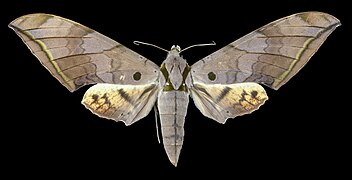Ambulyx substrigilis
| Dark-based gliding hawkmoth | |
|---|---|
 | |
| Scientific classification | |
| Domain: | Eukaryota |
| Kingdom: | Animalia |
| Phylum: | Arthropoda |
| Class: | Insecta |
| Order: | Lepidoptera |
| Family: | Sphingidae |
| Genus: | Ambulyx |
| Species: | A. substrigilis |
| Binomial name | |
| Ambulyx substrigilis | |
| Synonyms | |
| |
Ambulyx substrigilis, the dark-based gliding hawkmoth, is a species of moth of the family Sphingidae. It was described by John O. Westwood in 1847.[2]
Distribution
[edit]It is known from Sri Lanka, India, Nepal, Bangladesh, the Andaman Islands, the Nicobar Islands, Thailand, Vietnam, China (Hainan Island), Malaysia (Peninsular, Sarawak), Indonesia (Sumatra, Kalimantan) and the Philippines.[3]
Description
[edit]The wingspan is 96–120 mm.
- Female dorsal view
(from the collection of the MHNT) - Female ventral view
(coll. MHNT) - Male dorsal view
(coll. MHNT) - Male ventral view
(coll. MHNT)
Biology
[edit]The larvae have been recorded feeding on Aglaia littoralis in India.
Subspecies
[edit]- Ambulyx substrigilis substrigilis (Sri Lanka, India, Nepal, Bangladesh, Andaman and Nicobar Islands, Thailand, Vietnam, China (Hainan Island), Malaysia (Peninsular, Sarawak), Indonesia (Sumatra, Kalimantan), Philippines)
- Ambulyx substrigilis aglaia (Jordan, 1923) (India)
In The Fauna of British India, Including Ceylon and Burma: Moths Volume I, the species is described as follows:
The hind wing crenulate. Pale ochreous or greyish brown to purplish brown in color; an olive-green band between the antennae; lateral olive-green bands on the thorax meeting on metathorax; abdomen with two olive blotches on the fifth segment, and one on the seventh in some specimens; sides of palpi and pectus ferruginous; some specimens with a ferruginous line down the vertex of abdomen. Fore wing with a basal olive speck; a subbasal olive blotch on the costa, and another below the median nervure, the former being obsolete in some of the forms; two irregularly dentate, more or less obsolete antemedial lines, and two similar lunulate postmedial lines; a curved band from apex to outer angle, the inner part of which is light, the outer dark. Hind wing ochreous, mottled with fuscous; an erect medial, and curved more or less lunulate postmedial band; some specimens with the anal half of the margin dark. ... Larva pale green with darker granular spots; a white dorso-lateral line; pale yellow oblique streaks on 5th to 10th somites; horn purple with white granular spots.
— The Fauna of British India, Including Ceylon and Burma: Moths Volume I[4]
References
[edit]- ^ "CATE Creating a Taxonomic eScience - Sphingidae". Cate-sphingidae.org. Archived from the original on 2012-12-28. Retrieved 2011-10-26.
- ^ "Ambulyx substrigilis (Westwood, 1847)". International entomological community. Retrieved 5 July 2016.
- ^ Pittaway, A. R.; Kitching, I. J. (2018). "Ambulyx substrigilis substrigilis Westwood, 1847 -- Dark-based gliding hawkmoth". Sphingidae of the Eastern Palaearctic. Retrieved December 13, 2018.
- ^ Hampson, G. F. (1892). The Fauna of British India, Including Ceylon and Burma: Moths Volume I. Taylor and Francis – via Biodiversity Heritage Library.


 French
French Deutsch
Deutsch


